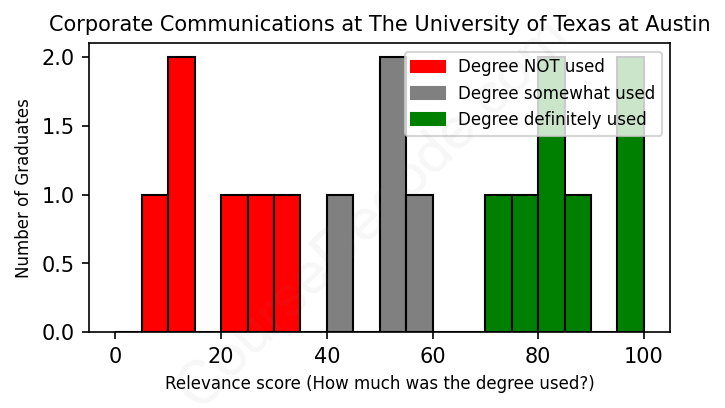
First, some facts. Of the Corporate Communications graduates from The University of Texas at Austin we've analyzed , here's how many have used (or NOT used) their degree in their career:

These are estimates based on AI analysis of 17 LinkedIn profiles (see below).
The verdict? Significantly below average. Overall, with an average relevance score of 53%, Corporate Communications graduates from The University of Texas at Austin have a much lower likelihood (-14%) of finding work in this field compared to the average graduate across all fields:
And for comparison, here's the chart for all profiles we've looked at across all degrees.
Also, after graduating, only 23% of these graduates have pursued further education other than another Bachelor's degree (such as a Masters degree or other), compared to the average across all profiles of 35%. This suggests a Bachelors degree is enough for most Corporate Communications graduates, and it's normal to look for work straight after graduation.
See the details:
|
Relevance score: 100% We think this person has gone into a career highly relevant to their degree. We think this person has gone into a career highly relevant to their degree.
DEGREE INFOGraduated in 2022 from The University of Texas at Austin with a Bachelor of Communications in Corporate Communications. No other secondary education since. JOB HISTORY SINCE GRADUATIONDigital Brand Strategy Assistant ModusBPCM Oct 2022 - Present ABOUTNo information provided. |
The top 10 most common jobs done by the graduates we've analyzed (ranked most common to least) are:
When you look at the jobs held by graduates from the Corporate Communications program at The University of Texas at Austin, a lot of them fall into similar categories like marketing, public relations, and management roles. Many of these jobs, particularly positions such as Co-Founder, President, or Digital Media Coordinator, do leverage communication strategies and branding, which are central to what you learn in Corporate Communications. For instance, being a Marketing Specialist or a Development & Communications Specialist definitely ties back to the core skills learned in the program, focusing on messaging, stakeholder engagement, and brand management.
However, it's clear that not every job directly aligns with the principles of Corporate Communications. Some graduates have taken on roles in sales, client management, or even positions in IT and legal fields, where the core responsibilities don’t really draw on what they studied. For example, positions like Lease & Title Analyst or various IT roles mainly focus on technical or administrative tasks instead of communications strategies. So, while there are plenty of graduates using their degree in ways that fit the field, a good number of them have drifted into jobs that don’t really make the most of their education. It’s a mixed bag, for sure, but those in roles closely aligned with Corporate Communications seem to thrive and find their niche!
Here is a visual representation of the most common words in job titles for Corporate Communications graduates (this is across all Corporate Communications graduates we've analyzed, not just those who went to The University of Texas at Austin):

It looks like graduates from the Corporate Communications program at The University of Texas at Austin generally land in a range of jobs that are quite relevant to their field, especially in the early years right after graduation. Many start off in roles that involve marketing, public relations, or some form of client engagement, like internships at cool companies or entry-level positions that help them hone their skills in communication and strategy. For instance, roles like Marketing & Public Relations Intern or Account Manager show that they’re often diving into hands-on experience that builds their understanding of the industry. Even those who venture into more niche sectors, like legal assistance or technology, still utilize their communication skills to some degree, which suggests a flexibility in how their degree can be applied.
As they progress in their careers, a lot of these alumni appear to move up into mid-level or even senior positions, which is a great sign! Over the years, they've been able to transition into management roles, strategic positions, and various specialized fields such as marketing management or operations. By around five to ten years after graduation, many of them are in leadership or senior roles, indicating that they’ve built strong careers that leverage their Corporate Communications background. Overall, while there are a few exceptions where individuals might not have stayed strictly within the communications realm, many seem to be doing well and finding success in relevant positions that likely offer fulfilling career paths. So, if you're considering studying Corporate Communications, it looks like a solid choice for a promising career!
Honestly, a Bachelor’s degree in Corporate Communications can be pretty manageable, especially at a big school like The University of Texas at Austin. It’s definitely not as rigorous as, say, an engineering or biology degree, but that doesn't mean it's all a walk in the park either. You’ll have to read a fair amount and work on group projects, which are pretty common in communications programs. A lot of the classes involve writing, presentations, and understanding media trends, so if you enjoy those kinds of things, you might find it easier. But like any degree, it really depends on how committed you are to keeping up with your studies and the effort you put in!
Most commonly, in the LinkedIn profiles we've looked at, it takes people 4 years to finish a Bachelor degree in Corporate Communications.
Looking at the job trajectories of these graduates from The University of Texas at Austin, it seems like some of them are doing quite well financially, while others may not be hitting those high earnings just yet. For instance, the grads from 2010 and 2011 who have climbed the ladder into management and executive roles at companies like Tableau Software and The Livestrong Foundation are likely making decent salaries. On the other hand, recent grads from 2020 and onwards seem to be starting off with internships and entry-level positions, which might not be paying that great initially. Overall, it looks like if you’re patient and gain experience, you can definitely work your way up to a solid income in the long run, especially in the corporate communications and tech fields!
Here is a visual representation of the most common words seen in the "about" section of LinkedIn profiles who have a Bachelor degree in Corporate Communications (this is across all Corporate Communications graduates we've analyzed, not just those who went to The University of Texas at Austin). This may or may not be useful:

Here are all colleges offering a Bachelor degree in Corporate Communications (ordered by the average relevance score of their Corporate Communications graduates, best to worst) where we have analyzed at least 10 of their graduates:
| College | Score | Count |
|---|---|---|
 Arizona State University Arizona State University
|
57 | 24 |
 Baruch College Baruch College
|
55 | 11 |
 The University of Texas at Austin The University of Texas at Austin
|
53 | 17 |
 Baylor University Baylor University
|
53 | 14 |